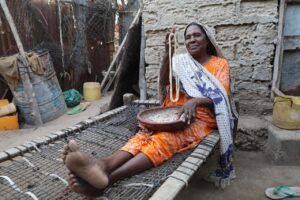By Hussein B. Gahnug
In the quiet coastal village of Madawa Island, where the waves once promised abundance, Zubayda Mohamed, a 55-year-old Somali Bajuni mother of six from Madawa Island, sits on a traditional woven bed outside her home, holding a small bowl filled with seashells.
With practiced hands, she threads each delicate shell into a necklace she calls “Imbe”, a Bajuni craft passed down through generations, made from the smooth shells left behind by tiny snails collected along the shoreline when the tide retreats. This is her new livelihood after the sea’s fish disappeared. “Each shell has its story,” she says softly. “It used to be the sea that gave us everything.”
For years, Zubayda and her husband survived through fishing. Her husband ventured into the deep blue waters at dawn, returning at sunset with baskets of fresh catch. She would clean, dry, and sell the fish at the village market which is a simple rhythm that sustained their family. But that rhythm has broken. Her life, like that of many island women, has always been bound to the sea, a sea that once nourished her family, her culture, and her dreams.

Zubayda Mohamed, a Somali Bajuni mother from Madawa Island, crafts “Imbe” necklaces from seashell, her new livelihood after the sea’s fish disappeared.
Today, Madawa Island which is once known as one of Somalia’s richest fishing zones is facing an uncertain future. The once-abundant waters are now barren. Illegal, unreported, and unregulated (IUU) fishing by foreign vessels has devastated local livelihoods. These vessels, operating without regard for Somali waters, deploy trawling nets that not only sweep up every fish in their path but also destroy coral reefs, seagrass beds, and marine biodiversity which is the very ecosystems that sustain coastal life.
“The fish are gone,” Zubayda says. “Now we live from what the sea leaves behind.”
She collects shells instead of fish, transforming them into necklaces she sells across the border in Kenya for 100 Kenyan shillings a piece. The modest income helps feed her children, but it cannot replace what the community has lost which is not just income, but identity.
Zubayda’s story reflects a deeper humanitarian crisis including livelihood erosion, ecological injustice, and resilience under pressure. The impact of IUU fishing extends beyond economics; it threatens food security, gender roles, and cultural continuity in Somalia’s coastal communities.
For the Bajuni people, the sea is more than a resource; it is a way of life passed down through generations.
Her story echoes across the coastline, a testament to the strength and endurance of those who depend on the sea for survival. Each day, she confronts the silent erosion of her livelihood, not only by the rough waves but by forces far beyond her control. The shadow of illegal, unreported, and unregulated fishing strips her community of opportunity, leaving behind empty nets and uncertain futures. Yet, amid loss and fatigue, she remains the beating heart of her family and her people’s resilience.
Her experience mirrors the struggle of many coastal families across Jubaland, where fragile livelihoods are tested by both climate shocks and human exploitation. The disappearance of fish stocks is more than an economic crisis; it is a humanitarian one. It touches on dignity, food security, and the right to live from one’s environment. Communities like hers continue to adapt, innovate, and endure, but their resilience should not be mistaken for infinite strength.
Yet, despite the hardship, Zubayda’s hands keep working, shell by shell. Her Imbe necklaces are small symbols of endurance. A quiet protest against exploitation and a testament to the human spirit’s ability to adapt.
Her words carry both pain and perseverance. “We do not have much,” she says, “but we still have hope.”
What her story calls for is not sympathy but solidarity and action. Stronger marine protection, fair resource governance, and regional cooperation are not mere policies; they are lifelines. Empowering coastal women, supporting sustainable fisheries, and curbing IUU fishing can transform despair into opportunity. Her voice, and the many like hers, remind us that protecting the ocean is not only about conservation but about justice, survival, and the promise of a shared future.
Hussein B. Gahnug is an environmentalist and humanitarian activist. He can be reached at gahnug.hm@gmail.com.


